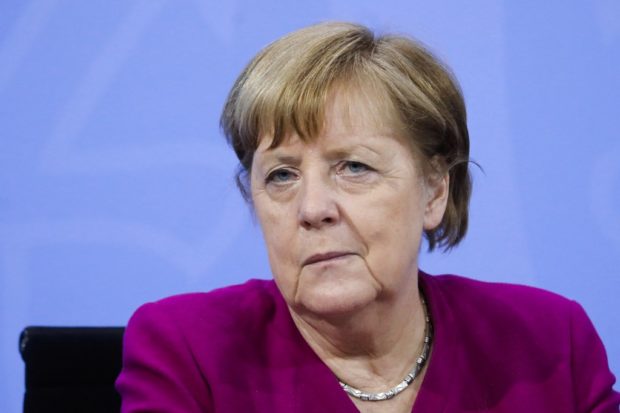Bowing to pressure, Germany’s Merkel eases coronavirus curbs

German Chancellor Angela Merkel delivers a press conference with Bavarian state governor Markus Soeder and the Mayor of Berlin Michael Mueller (out of frame) following talks via video conference with Germany’s state premiers on the extension of the current Covid-19 restrictions, at the Chancellery in Berlin early on March 3, 2021. Photo by Markus Schreiber / POOL / AFP
BERLIN — German Chancellor Angela Merkel on Wednesday agreed to gradually ease virus curbs in Europe’s top economy, caving to political pressure and public discontent seven months before a general election.
After more than nine hours of talks, Merkel and Germany’s 16 regional leaders unveiled a step-by-step plan to relax restrictions after months of shutdowns, despite concern over the spread of new and more aggressive virus variants.
“Today, we can talk of hope and a transition to a new phase” in the fight against the pandemic, the veteran chancellor told a Berlin press conference.
Merkel said the loosening of restrictions, tied to strict conditions, was justified because of the imminent ramp-up in vaccinations and the arrival of mass rapid testing.
The easing comes as Germans are losing patience with the coronavirus measures and many businesses are struggling to stay afloat.
Article continues after this advertisementA recent YouGov survey found that just 35 percent of Germans supported the current shutdowns, down from 73 percent at the start of the pandemic last year.
Article continues after this advertisementFrom Monday, Germans will be allowed to socialize more, with up to five adults from two households allowed to meet up. Young children will not be counted.
Currently, one household is only allowed to meet with one other person.
Book shops, flower stores and garden centers will reopen nationwide, with hairdressers already having reopened, as well as some schools.
‘Emergency brake’
Further reopenings in retail and other areas of public life will be allowed in areas with fewer than 50 new infections per 100,000 residents over a seven-day period.
Merkel had pushed for an incidence rate of 35 but was forced to back down in the face of resistance from regional premiers.
The nationwide figure has hovered at around 60 for the past weeks, but there are huge regional differences.
Should the incidence rate shoot up again to over 100, an “emergency brake” will be triggered to reinstate shutdowns, Merkel said.
The relaxations will happen gradually and many of the current virus restrictions will stay in place until March 28.
Merkel highlighted “the danger” of a possible third wave caused by the British variant of the coronavirus. The more contagious strain now accounts for almost half of all new infections in Germany.
Free tests
Faced with criticism over the slow pace of its Covid-19 inoculations, Merkel said the country’s vaccine commission would soon authorize the AstraZeneca/Oxford jab for the over-65s.
The regulator initially ruled there was insufficient data to greenlight the jab for the elderly, but Merkel said recent studies had confirmed the jab’s effectiveness.
To further speed up the inoculations, doctor’s offices will be allowed to start injecting people by early April, alongside the jabs given in designated vaccination centers.
Germany is also betting on mass rapid testing to ward off another surge in Covid-19 cases.
All Germans will soon be offered at least one free rapid test a week, Merkel said. Staff at schools and daycares, as well as pupils, will also be tested regularly.
And cheap at-home test kits will be available in drug stores and supermarkets in the coming days.
Campaign mode
It remains to be seen whether the latest announcements will be enough to quiet the critics.
With non-essential shops, tourism and restaurants shuttered since late last year, business federations fear a wave of bankruptcies despite the government’s massive coronavirus aid packages.
And although Merkel was praised for her handling of the first coronavirus wave last spring, the country has coped far less well with the second wave.
After more than 15 years in power, Merkel is due to bow out at the next elections in September.
Observers say her legacy could be tarnished by missteps made during the pandemic.
Opposition parties and even Merkel’s junior coalition, the centre-left Social Democrats (SPD), are already in campaign mode and have not shied away from attacking the chancellor.
SPD co-chief Norbert Walter-Borjans has described Merkel’s crisis coordination as “lacking”.
Finance Minister Olaf Scholz, the SPD’s candidate for chancellor, has openly and repeatedly slammed Germany’s slow and bureaucratic vaccination efforts.
As of Wednesday, just 4.4 million Germans had received their first jab, amounting to 5.3 percent of the population.
For more news about the novel coronavirus click here.
What you need to know about Coronavirus.
For more information on COVID-19, call the DOH Hotline: (02) 86517800 local 1149/1150.
The Inquirer Foundation supports our healthcare frontliners and is still accepting cash donations to be deposited at Banco de Oro (BDO) current account #007960018860 or donate through PayMaya using this link.